21 Stocks to Make You Rich
Five-star money managers reveal their best investment ideas.
Profit and prosper with the best of Kiplinger's advice on investing, taxes, retirement, personal finance and much more. Delivered daily. Enter your email in the box and click Sign Me Up.
You are now subscribed
Your newsletter sign-up was successful
Want to add more newsletters?

Delivered daily
Kiplinger Today
Profit and prosper with the best of Kiplinger's advice on investing, taxes, retirement, personal finance and much more delivered daily. Smart money moves start here.

Sent five days a week
Kiplinger A Step Ahead
Get practical help to make better financial decisions in your everyday life, from spending to savings on top deals.

Delivered daily
Kiplinger Closing Bell
Get today's biggest financial and investing headlines delivered to your inbox every day the U.S. stock market is open.

Sent twice a week
Kiplinger Adviser Intel
Financial pros across the country share best practices and fresh tactics to preserve and grow your wealth.

Delivered weekly
Kiplinger Tax Tips
Trim your federal and state tax bills with practical tax-planning and tax-cutting strategies.

Sent twice a week
Kiplinger Retirement Tips
Your twice-a-week guide to planning and enjoying a financially secure and richly rewarding retirement

Sent bimonthly.
Kiplinger Adviser Angle
Insights for advisers, wealth managers and other financial professionals.

Sent twice a week
Kiplinger Investing Weekly
Your twice-a-week roundup of promising stocks, funds, companies and industries you should consider, ones you should avoid, and why.

Sent weekly for six weeks
Kiplinger Invest for Retirement
Your step-by-step six-part series on how to invest for retirement, from devising a successful strategy to exactly which investments to choose.
Of the infinite number of possible stock-picking strategies, one that we particularly like can be summed up in three words: The pros know. In other words, ask the experts what stocks they're buying and you're likely to come up with some pretty good ideas. Last year, we asked seven top portfolio managers to name their favorites, and their 22 choices returned an average of 29% to May 14, well ahead of the 18% gain of Standard & Poor's 500-stock index (for more details, see Our Team Gains 29%).
Now we've rounded up a new group of outstanding managers using the same simple criteria we used to pick last year's bunch: They all have produced superior records, over both the short term and the long term. When these folks discuss their best investing ideas, it's worth listening in.
A Berkshire bent
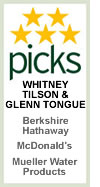
Many a mutual fund manager has bolted to the free-wheeling, less-regulated, potentially more lucrative hedge-fund world. Whitney Tilson and Glenn Tongue have done almost the reverse. They launched their first hedge fund in January 1999 (it returned an annualized 11%, after fees, to May 1, compared with an annualized gain of 4% for the S&P 500). Then in March 2005 they unveiled Tilson Focus, a concentrated mutual fund that invests in undervalued companies of all sizes. It returned 20% over the past year.
From just $107.88 $24.99 for Kiplinger Personal Finance
Become a smarter, better informed investor. Subscribe from just $107.88 $24.99, plus get up to 4 Special Issues

Sign up for Kiplinger’s Free Newsletters
Profit and prosper with the best of expert advice on investing, taxes, retirement, personal finance and more - straight to your e-mail.
Profit and prosper with the best of expert advice - straight to your e-mail.
Tilson and Tongue look for safety, low price and rapidly growing value when they shop for stocks. If this reminds you of a certain investor in Omaha, it's for good reason. "We admit to being loyal Buffett disciples," says Tilson.
No surprise then that Warren Buffett's Berkshire Hathaway (BRK-A) is Tilson Focus's largest holding. Tilson and Tongue see safety in Buffett's triple-A-rated holding company: "Its balance sheet is Fort Knox-safe," says Tongue. The value of Berkshire's operating companies in particular, such as Geico, Gen Re and Shaw Industries, is compounding at a furious pace. Tilson says that pretax earnings of Berkshire's operating companies swelled by more than 30% a year from 1995 through 2006.
And Tilson and Tongue reckon that the shares are still cheap. When they apply a modest price multiple to the operating businesses and add the value of Berkshire's cash, bonds and big stakes in publicly traded companies, such as Coca-Cola, Moody's and American Express, they arrive at an intrinsic value of $150,000 a share for Berkshire, a 36% premium to the stock price of $110,000 (Berkshire Class B shares change hands for a mere $3,668).
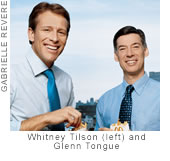
The story with McDonald's (MCD) is different. This is a remarkable turnaround that Wall Street has consistently underestimated. The stock price has tripled since Tilson and Tongue first bought shares for their hedge fund in December 2002. A stream of successful new-product launches, such as McGriddles, salads and premium coffee, has produced more revenues (sales at stores open at least one year surged a tasty 8.2% in March) through a fixed asset base, resulting in rapidly expanding profit margins. Tilson thinks the stock, recently $51, is worth at least $60 a share.
Mueller Water Products (MWA) is a more traditional deep-value pick. Spun off from Walter Industries late last year, Mueller is the leading maker and supplier of water-infrastructure products, such as fire hydrants, valves, couplings and transmission pipes. The stock, which sells at a small premium to book value (assets minus liabilities), has been depressed by the housing recession. But the water infrastructure in the U.S. is in urgent need of repair or replacement, so Tilson thinks it's just a matter of time before Mueller's flow of profits increases. He sees more than 50% upside in the stock, recently trading at $16.
[page break]
Overseas and out-of-favor
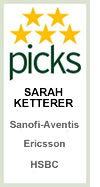
Since launching Causeway International Value fund in 2001, Sarah Ketterer hasn't been afraid to go against the grain. She favors companies that are attractively priced because of temporary difficulties, and she will take large positions in a country or sector if the fund's strict stock-picking regimen determines that's where the values are. With a $5-billion portfolio of large-company stocks, the fund seemingly has lots of room to grow. Yet Ketterer closed it to new investors to retain the flexibility to move back into midsize companies when prices in that segment moderate. Investors who got in before the doors were locked have been rewarded with a 17% annualized return over the past five years, which was achieved with relatively low volatility.
One of Ketterer's top picks, Sanofi-Aventis (SNY), illustrates how she achieves those low-risk returns. Shares of the Paris-based drug giant have fallen about 9% since July 2006 because of concerns about generic competition and delays in the launch of its anti-obesity product, Acomplia. But a rich pipeline of 65 potential drugs should ensure strong earnings growth in coming years. Meanwhile, says Ketterer, the company should generate a staggering $55 billion in free cash flow (cash left over after paying bills and reinvesting in the business) over the next five years, which should support the share price, recently $46. The company could use the cash to repurchase shares and to bolster its dividend. "The downside is practically nil, barring the unexpected," Ketterer says.

A somewhat riskier pick is Ericsson (ERIC), which built the infrastructure that handles 40% of the world's mobile-phone calls. The Swedish telecom-equipment giant should benefit from strong expected growth in mobile traffic over the next few years. But it operates in an inherently volatile business, and the declining value of the dollar hurts profits earned in the U.S. and in Asian countries with currencies pegged to the greenback. Still, "the stock is too undervalued to ignore," says Ketterer. The shares, at $38, could return 15% to 20% annually over the next couple of years, she says.
HSBC (HBC), the London-based banking giant, has taken its lumps from a subsidiary involved in the foundering U.S. subprime-mortgage business. But with a price-earnings ratio of 13, says Ketterer, it's "quite a bargain for a company that operates globally and with a strong Asia business that is expected to produce earnings growth of 20% to 30% a year." What's more, she adds, the bank is overcapitalized, meaning there's plenty of cash available for paying dividends and buying back stock. Even now, the shares yield a generous 4.3%.
Great companies with principles
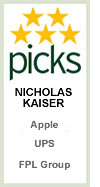
Nicholas Kaiser has steered Amana Trust Growth fund to market-beating performance over the past ten years, even though he is, in effect, working with one hand tied behind his back. The fund invests according to Islamic principles, so it must avoid financial stocks and companies with high debt (because of a prohibition against collecting or paying interest) as well as businesses associated with liquor, gambling and pornography. As a result, about half of the U.S. stock market is off-limits. Despite these restrictions, Kaiser has delivered excellent returns: an annualized 14% over the past decade, compared with 8% for the S&P 500.
One of Kaiser's favorite picks is Apple (AAPL). He began buying the computer and iPod maker several years ago at $14 a share, and he still likes it at $109. Yes, the shares look pricey at 30 times expected 2007 earnings, but the P/E has actually been falling as Apple's bubbling product pipeline has churned out one hit after another. Apple's earnings in the first quarter of 2007 soared 85% over the same period a year earlier, well beyond analysts' expectations.
Kaiser believes the company can keep up this impressive performance. He cites the release this year of a new generation of power-hungry digital-design-and-imaging software programs from Adobe. The software, he says, will provide a major boost to sales of Apple's high-end Mac Pro workstations, which start at $2,500. "Every media desktop jockey is going to want to have one of those things," he says. This summer's release of the long-awaited iPhone and the fall debut of the Leopard operating system are further hits in the making, he says.
Kaiser holds a slew of transportation stocks in the fund, and one of his favorites is UPS (UPS). Although its U.S. package-delivery business provides nearly two-thirds of revenues, it faces fierce competition. What excites Kaiser is UPS's logistics business, which offers services ranging from consulting to running a company's entire shipping program. Although it generates just 17% of UPS's revenues, "it's the growth engine," says Kaiser. A $1.68 annual dividend provides a nice 2% yield on UPS's shares.
Clean energy is not one of Amana's mandates, but that doesn't stop Kaiser from endorsing FPL Group (FPL), a Florida utility that's one of the world's largest producers of electric power from wind. Although Kaiser views the utility's emphasis on renewable energy as a plus, he is mainly attracted by its growing customer base, which encompasses about half of Florida's population, and its unregulated wholesale business, which sells low-cost power generated from nuclear plants and other sources. FPL has a "good, steady flow of earnings, an increasing dividend, and it's something we know makes money," he says. The $1.64 dividend has grown nearly 10% annually over the past three years and provides a 3% yield.
[page break]
Growing and reasonably priced
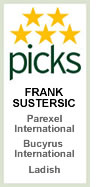
Most of the high-flying funds that returned 100% or more in 1999, the last year of the tech bubble, have long since crashed and burned. One exception is Turner Emerging Growth. The fund, which focuses on small, fast-growing firms, followed a 144% leap in 1999 with gains of at least 10% in every year except 2002, when it lost 20%. Its annualized 14% return over the past five years easily beat that of the Russell 2000 Growth index. (The fund is closed to new investors.)
Manager Frank Sustersic looks for companies with annual revenue growth of at least 10%, scrutinizing them for weaknesses in their business models. He's also sensitive to price; he dislikes P/Es that are higher than a company's growth rate. That kept the fund out of trouble when the tech bubble burst.
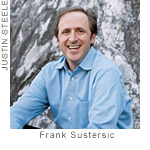
One of Sustersic's top picks is Parexel International (PRXL), among the world's largest providers of clinical research for pharmaceutical and biotech firms. The industry is experiencing "phenomenal growth," in part because the U.S. Food and Drug Administration is requiring more clinical tests, says Sustersic, a health-care analyst by training. Parexel, based in Waltham, Mass., operates in 36 countries and has a backlog of orders totaling more than $1 billion. Its U.S. operations have historically been unprofitable, but Sustersic says that's about to change -- one reason he likes Parexel despite its high P/E of 27 times this year's expected earnings.
Another firm benefiting from a hot market is Ladish Co. (LDSH), a maker of jet-engine parts and other aerospace products. The industry is experiencing a burst of growth, spurred in part by major new jetliners from Boeing (787 Dreamliner) and Europe's Airbus (A380). Like Sustersic's other favorites, Ladish has a healthy backlog -- more than $500 million worth of business. Its shares stumbled, though, after an earnings disappointment in the fourth quarter of 2006 that Sustersic attributes to a plant-maintenance closing that lasted longer than expected. As a result, the shares are selling for a relatively modest 18 times estimated 2007 profits.
Sustersic's third pick, Bucyrus International (BUCY), also made our list last year. The South Milwaukee, Wis., company manufactures large-scale excavation equipment for the surface mining of coal, copper, oil sands and other minerals. Weakness in coal prices has hung over the shares for the past year. But the long-term demand for coal is robust, and the firm has an order backlog of nearly $900 million, up from $659 million a year earlier. "I love firms that have good earnings visibility from a stable or growing backlog," says Sustersic. The stock trades for about 22 times this year's expected earnings, and analysts expect profits to grow by 33% this year and 28% in 2008.
Growth Franchises
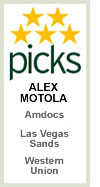
Although most growth managers have been mired in a severe slump the past several years, Alex Motola, of Thornburg Core Growth, has maintained a high batting average. During the past three years, his growth fund, which invests in companies of all sizes, has returned an annualized 22%, more than twice the performance of the benchmark Russell 3000 Growth index. Motola says he searches for highly sustainable, growing franchises that are selling at reasonable prices and that are not subject to constant technological innovation or price competition.
His largest position is in Amdocs (DOX), a billing-software and customer-care provider for the telecommunications industry. Clients such as Sprint Nextel and Bell Canada hire Amdocs to install software and operate billing and customer-care applications. Between Amdocs' rising profit margins and recovering stock values in the telecom sector, Motola still sees good upside in the shares, which trade at 17 times estimated profits.
In Las Vegas Sands (LVS), Motola says he's making the rare exception of paying up for a pricey stock: The casino operator sells at 55 times estimated 2007 earnings. Motola anticipates a rising tsunami of earnings and cash flow starting in 2008. "The value is wrapped up in licenses and in Sands' ability to execute," he says.
Sands' founder and controlling shareholder, Sheldon Adelson, is successfully exporting his brand and expertise to Asia, Motola says. The septuagenarian hit the jackpot with Sands Macau. Las Vegas Sands will own or operate seven of ten new properties on the Cotai Strip, a Macau landfill project under construction. "Chinese have a high propensity to gamble," says Motola, who calculates that one billion people live within three hours' flying time of Macau.
Motola also likes the global footprint and powerful brand recognition of Western Union (WU), the venerable money-transfer outfit. A recent spinoff from First Data, Western Union has an unmatched network of 260,000 agents around the world and leadership in a highly fragmented industry. Motola says the company is a play on immigration and the increasing global migration of labor; Mexican immigrants use the network to send money back home, Filipinos working in the Persian Gulf send savings back to the Philippines, and so on. A strong cash generator, Western Union trades for 19 times this year's expected earnings.
[page break]
Overseas stock shopper
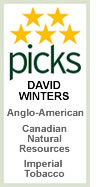
If Alex Motola is one of the best young growth managers in the mutual fund business, David Winters is one of the top young value-investing practitioners. Winters learned his craft at Mutual Series, at the feet of a master, Michael Price. A couple of years back, Winters left his post as chief investment officer of Mutual Series to start his own fund, Wintergreen. Over the past year, Wintergreen returned 20%.
Winters says he's on a "global shopping expedition" and is finding the best deals overseas. One of his favorites is U.K.-based Anglo-American (AAUK), "an incredible treasure trove of assets that can't be duplicated." Winters enthuses over Anglo-American's rich diamond and platinum deposits. The metals-and-minerals giant holds a 45% stake in privately held DeBeers, which "has done a spectacular job convincing women, and the men who love them, that they need diamonds," he quips. Winters figures that hundreds of millions of aspirational Chinese women, trading up from jade jewelry, are potential diamond customers.
An adept numbers-cruncher, Winters looks for undervalued assets and an alluring discount to his assessment of a company's true value before he purchases a stock. But he also zeros in on quality of management. "People matter," he says. "In general, the best investments and worst investments are because of people." Winters looks for executives who focus on building a business's value.
Winters loves the management of Canadian Natural Resources (CNQ), a petroleum company with a large stake in the oil sands of Alberta. Led by Murray Edwards, a team of managers has acquired large oil reserves cheaply. If oil prices don't budge, Winters figures Canadian Natural will still do fine. Plus, managers own $1 billion of company stock. "They're in the boat pulling the oars in the same direction as shareholders," notes Winters.
He also admires the managers of Imperial Tobacco (ITY), which has "done a spectacular job for shareholders." A spinoff in 1996 from Hanson, a British conglomerate, Imperial has made intelligent acquisitions of cigarette brands and consistently returned capital to shareholders through higher dividends and share repurchases. Winters doesn't smoke, but he seems to have an addiction to tobacco stocks, which accounted for 21% of Wintergreen's portfolio at the end of 2006.
Pleasure Picker
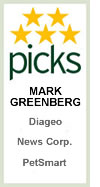
Sector funds tend to be streaky and volatile. Mark Greenberg's AIM Leisure is an exception. Over the past decade, it returned more than 15% annualized, nearly double the market's return, with impressive consistency. Greenberg, who started following the leisure business -- what he calls "all the fun stuff in life" -- in 1983, picked an alluring sector. In the U.S., Europe and Asia, consumer spending on such non-necessities as travel, alcoholic beverages and movies routinely grows faster than the overall economy.
One of Greenberg's favorite stocks is Diageo (DEO), the largest owner of liquor brands, including Smirnoff and Tanqueray. "When you're at the bar, you say 'Captain Morgan,' not rum; 'Johnnie Walker,' not Scotch," says Greenberg, who worked as a hotel bartender while in college in Milwaukee. "When liquor is mixed, you can't even tell what you're drinking." It doesn't cost much more to distill branded liquor than generic, but Diageo can sell Johnnie Walker for several dollars more per bottle. The difference shows up in Diageo's robust cash flow and steadily rising dividends.
No matter what you think of Rupert Murdoch's politics, there's no denying that he runs a potent media shop in News Corp. (NWS) Greenberg says Murdoch has been particularly adept at seizing international opportunities and harnessing the Internet (MySpace was a clever acquisition) for cross-marketing purposes. Fox has the highest profit margins of any Hollywood studio, says Greenberg, and the Fox Network churns out popular TV hits with global appeal, such as The Simpsons and American Idol. Shares of News Corp., which has disclosed that it wants to buy Dow Jones, recently traded at 17 times Greenberg's forecast for 2008 earnings.
His final pick exemplifies the discretionary spending of a leisure society: the fast-growing pet-store chain PetSmart (PETM). "It's amazing how much people love their dogs and cats," says Greenberg. The pet industry is growing twice as fast as the economy, and Americans pamper their little friends (dog-and-cat hotels are one of PetSmart's expanding businesses). PetSmart and privately owned Petco are the category-killers in this industry, elbowing aside tiny neighborhood pet shops.
Profit and prosper with the best of Kiplinger's advice on investing, taxes, retirement, personal finance and much more. Delivered daily. Enter your email in the box and click Sign Me Up.
-
 Dow Adds 1,206 Points to Top 50,000: Stock Market Today
Dow Adds 1,206 Points to Top 50,000: Stock Market TodayThe S&P 500 and Nasdaq also had strong finishes to a volatile week, with beaten-down tech stocks outperforming.
-
 Ask the Tax Editor: Federal Income Tax Deductions
Ask the Tax Editor: Federal Income Tax DeductionsAsk the Editor In this week's Ask the Editor Q&A, Joy Taylor answers questions on federal income tax deductions
-
 States With No-Fault Car Insurance Laws (and How No-Fault Car Insurance Works)
States With No-Fault Car Insurance Laws (and How No-Fault Car Insurance Works)A breakdown of the confusing rules around no-fault car insurance in every state where it exists.
-
 Dow Adds 1,206 Points to Top 50,000: Stock Market Today
Dow Adds 1,206 Points to Top 50,000: Stock Market TodayThe S&P 500 and Nasdaq also had strong finishes to a volatile week, with beaten-down tech stocks outperforming.
-
 Stocks Sink With Alphabet, Bitcoin: Stock Market Today
Stocks Sink With Alphabet, Bitcoin: Stock Market TodayA dismal round of jobs data did little to lift sentiment on Thursday.
-
 Dow Leads in Mixed Session on Amgen Earnings: Stock Market Today
Dow Leads in Mixed Session on Amgen Earnings: Stock Market TodayThe rest of Wall Street struggled as Advanced Micro Devices earnings caused a chip-stock sell-off.
-
 Nasdaq Slides 1.4% on Big Tech Questions: Stock Market Today
Nasdaq Slides 1.4% on Big Tech Questions: Stock Market TodayPalantir Technologies proves at least one publicly traded company can spend a lot of money on AI and make a lot of money on AI.
-
 Fed Vibes Lift Stocks, Dow Up 515 Points: Stock Market Today
Fed Vibes Lift Stocks, Dow Up 515 Points: Stock Market TodayIncoming economic data, including the January jobs report, has been delayed again by another federal government shutdown.
-
 Stocks Close Down as Gold, Silver Spiral: Stock Market Today
Stocks Close Down as Gold, Silver Spiral: Stock Market TodayA "long-overdue correction" temporarily halted a massive rally in gold and silver, while the Dow took a hit from negative reactions to blue-chip earnings.
-
 Nasdaq Drops 172 Points on MSFT AI Spend: Stock Market Today
Nasdaq Drops 172 Points on MSFT AI Spend: Stock Market TodayMicrosoft, Meta Platforms and a mid-cap energy stock have a lot to say about the state of the AI revolution today.
-
 S&P 500 Tops 7,000, Fed Pauses Rate Cuts: Stock Market Today
S&P 500 Tops 7,000, Fed Pauses Rate Cuts: Stock Market TodayInvestors, traders and speculators will probably have to wait until after Jerome Powell steps down for the next Fed rate cut.